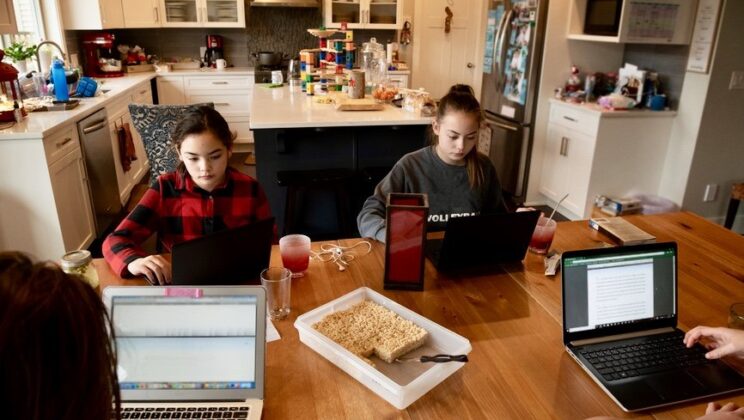Mission Impossible: Learnings From 6 Working Parents in the Time of Coronavirus
April 15, 2020
Upended routines, constant interruptions, working into the night, and a feeling of failure both on the job and as a parent are all in a day’s work for many parents as the COVID-19 pandemic continues. While the ability to work from home during this public health crisis is a privilege, it also means significant challenges and added pressures for working parents.
A recent Kaiser Family Foundation poll showed that parents of children under 18 are disproportionately concerned about someone in their family getting sick, and are much more likely to report that “their lives have been disrupted” by the pandemic. In fact, with working parents pulling triple-duty between work, child care, and homeschooling, “disruption” is an understatement. Add to that the mental and emotional toll of a life and livelihood-threatening pandemic, and facing their kids' questions and fears amid this first-in-our-lifetime scenario. For many parents, what was an exhausting and stressful work-family balancing act before now feels overwhelming and impossible.
We asked six parents who are working full-time while sheltering at home with their young children about how they’re getting through each day in the age of the coronavirus, and what they’ve learned from the experience so far.
Parents' names have been changed to protect privacy, and their responses have been lightly edited for length and clarity.
Trying to juggle work with kids at home is really hard
Even for non-parents, working from home during the current shelter-in-place orders throughout most of the U.S. is a big transition. Typical pitfalls include distractions, technology hiccups, feeling isolated, and overworking, which can lead to burnout. In interviews, parents shared how those mental health challenges are compounded now that they’re tasked with simultaneously balancing their normal work obligations with caring for their children while confined at home.
April, a marketer and mother to a 3-year-old and a 1-year-old: Being a parent of young kids is hard. Being a parent who’s present, while there are still meetings on the calendar, tasks, and projects looming is really hard. You still have to work even when your kid is whining in the next room, someone’s having a meltdown, and your husband is making noise from his conference call. I'm trying to get tasks completed as quickly as possible so I can move on to the next thing, because I don't know when I might be interrupted next.
Melanie, a psychologist and mom of a 6-year-old and a 1-year-old: Trying to align my schedule with my husband's schedule to watch the kids, homeschool my son, and care for my daughter in between meetings are by far the biggest struggles. We also struggled with gaining some semblance of normalcy and routine, which is especially helpful for our oldest, who has special needs. Not having the support of his teachers and special education team has made this particularly challenging.
Brian, a marketer and father to a 2-year-old: Having my 2-year old son home with us every day has completely shaken up our work routine. While we certainly appreciate the extra time with him, it’s been very difficult for us to stay productive. We're trying our best to get used to the new norm of splitting our day with him and trying to manage important meetings and work.
Jamie, analyst for a non-profit organization and mom to a 4-year-old: [My husband] wants to help, but his meeting schedule is more demanding than mine. Because I don't get as much done during the regular workday, I try to do more work after [my daughter] goes to bed at night.
Anna, a psychologist and mom to a 6-year-old: Several times each day I'm forced to choose between supporting my team at work and supporting my child, who is craving attention, learning, and support. Much of my non-critical work is on the backburner, not because I have that luxury, but because there isn't another way.
The stress, anxiety, and guilt are real
The dual pull of parenting and work responsibilities without any school or child care support combined with the stress of living through a pandemic leaves parents overwhelmed and exhausted. Most of the parents we interviewed also mentioned feeling guilty when they inevitably struggle to give their full attention to either work or parenting.
Liz, a marketing program manager and mother to a 2-year-old: I definitely feel overwhelmed and stressed when both work and my daughter need me at the same time. Thankfully, she’s started to understand that there are times when she needs to play quietly by herself, like when my husband and I are both in a meeting. However, there are those inevitable times when it feels like I'm being pulled in a million different directions. Then I feel overwhelmed and stressed that I'm going to let the team down, miss something, or somehow "get in trouble".
Anna: I'm grateful to be employed and that my family is not sick. However, I'm stressed, I'm overwhelmed, I'm resentful that even though I'm exhausted, my work, my family life, and my child's education are functioning at sub-par levels.
Brian: My partner and I are both stressed, anxious, and sometimes completely overwhelmed with this situation. Work for both of us could already be stressful, but knowing that we can only be 60 percent productive, even while working at night, causes extra anxiety. Seeing [our son] behave poorly when we’re ignoring him, or zoning out with TV for far too long during the day also makes you feel like a bad parent.
Jamie: I feel inadequate both as a parent and an employee, because I feel like I'm half-assing both on most days.
You’ll probably need to lower your expectations, and that’s okay
As working parents do their best to adapt to this “new normal,” many are also finding that they need to adjust the rules and routines they typically have for their children.
Natalie Graber, a licensed professional counselor and senior member of Lyra’s clinical care navigation team, notes that parents are inundated with social media portrayals of other parents’ seemingly ultra-productive days sheltering at home with kids, complete with color-coded schedules for home-schooling and arts and crafts activities.
“This may make you feel like you ‘should’ be at your most productive and organized at work and home-schooling and creativity and fun with kids in down-time,” she says. “That just isn’t possible, and can leave parents feeling even more drained and overwhelmed.”
Letting go of these “shoulds” can provide some relief under the current circumstances, says Graber. In fact, according to the parents we interviewed, relaxing their usual standards has been indispensable in making it through each day.
Melanie: My son definitely gets more screen time than I like, but I only have so much bandwidth as a parent to constantly engage him while my husband and I are occupied with meetings.
Brian: Nothing right now is normal for us, so while we’re doing our best to keep our son on a schedule, we're also trying to make the experience as positive and constructive as possible. That means extra TV now and then, lots of activities, video calls with friends and relatives, and acknowledging that his sometimes poor behavior comes from a place of frustration with the situation. We're trying to show affection and understanding whenever possible, and a few extra "special treats" here and there help as well.
Jamie: I was never a stickler about screen time, but there are days that [my daughter] watches Frozen I or II from start to finish, sometimes BOTH. We've been taking advantage of friends' activity ideas and free online resources for kids. Also, she's getting sweets on a daily basis, whereas before she'd only get candy on weekends.
There are some positives
As undeniably hard as this situation is for working parents, most of those we interviewed have also noticed some silver linings. Each one mentioned things they’re grateful for during this pandemic: the ability to work safely from home, supportive partners, and patience and understanding from colleagues.
Melanie: There are the little moments of joy and happiness I get snuggling and hugging my kids, along with spending time with them. And I get to spend much more time with my family because we're not spending two hours of our lives scrambling to get the kids to school or daycare and then running off to work ourselves. I feel like life is slowing down, and I appreciate that we’re fortunate to have this opportunity.
Jamie: As much as I feel like a mess on most days, I'm thankful for the extra time I have with [my daughter]. We're also prioritizing spending time outside–at a safe distance from others–which helps keep me sane.
April: Before, when I worked at the office, I would only see my kids for an hour in the morning and two hours after work. Now, I get to spend two to four additional hours with them during the day that I didn't have.
Compassion (especially for yourself) is key
While each of the parents we spoke with mentioned feeling guilty and stressed, many also say they’re trying to be patient with themselves during these unprecedented circumstances. Practicing this type of self-compassion is crucial for working parents anytime, but especially now, according to Graber.
“This is a very unusual situation that was impossible to prepare for and likely won't happen in this way again,” she says. “It’s unrealistic to expect being able to perform at 100 percent in every domain of your life. Showing some compassion for yourself on a regular basis can help alleviate some of that pressure.”
April: I aim to tell myself, “It's a tough situation, it takes time to transition, you're doing the best you can.”
Brian: My partner and I are trying to show ourselves and each other more compassion. As far as colleagues, I've been open about my challenges and everyone has been amazingly understanding. No one is working or parenting at 100 percent right now and we shouldn’t expect anyone to be. I don't know a single parent who thinks there’s a way to make things work perfectly, myself included.
Melanie: Everyone is adjusting and NONE of this is normal. We’re all having a normal reaction to a very abnormal situation.
When to seek professional support
Beyond self-compassion, there are a number of things parents can do to help ease stress, such as practicing mindfulness and self-care. That could be as simple as taking time for a quick walk around the neighborhood, a phone call with a friend, or some deep breathing exercises.
Connecting back to your core values is another way to gain some perspective during this difficult time, says Graber. “Your kids will likely not remember exactly what you taught them or how organized you were for home-schooling. Similarly, you may not remember the intricacies of the work you were doing during this time,” she says. “When you feel yourself getting caught up in thoughts of needing to be 100 percent ‘on’ in every domain, take a moment and connect back to the intentions of how you want this time to feel,” she says.
However, if you notice a persistent change in mood or functioning (for example, if you’re eating all the time, you’ve stopped sleeping, you can’t concentrate on work, or the pressures of work and parenting feel unmanageable), it’s probably time to get some extra support. Many mental health care providers are now offering virtual appointments so you can get the care you need at home.
Meanwhile, although the days may look a little different for each of the parents interviewed, all agreed on one thing: These are incredibly challenging times, and if there were ever a moment for parents to cut themselves some slack, it’s now.
CONTACT US
If you want help connecting with a therapist, Lyra can assist you. You can get started today if Lyra is offered by your employer. Sign up now.
For employers who want to learn more about how Lyra’s enhanced EAP addresses network adequacy and quality issues, download our whitepaper on quality or get in touch.
And check in frequently here or follow us on Facebook, LinkedIn, and Twitter for more insights into supporting employees' mental health.
DISCLAIMER:
The content of this blog is not intended to be a substitute for professional medical advice, diagnosis, or treatment.
Explore additional blogs

Youth mental health
Building a Village for Family Mental Health Care

Youth mental health
4 Things You Should Know About Adolescent Mental Health

Youth mental health